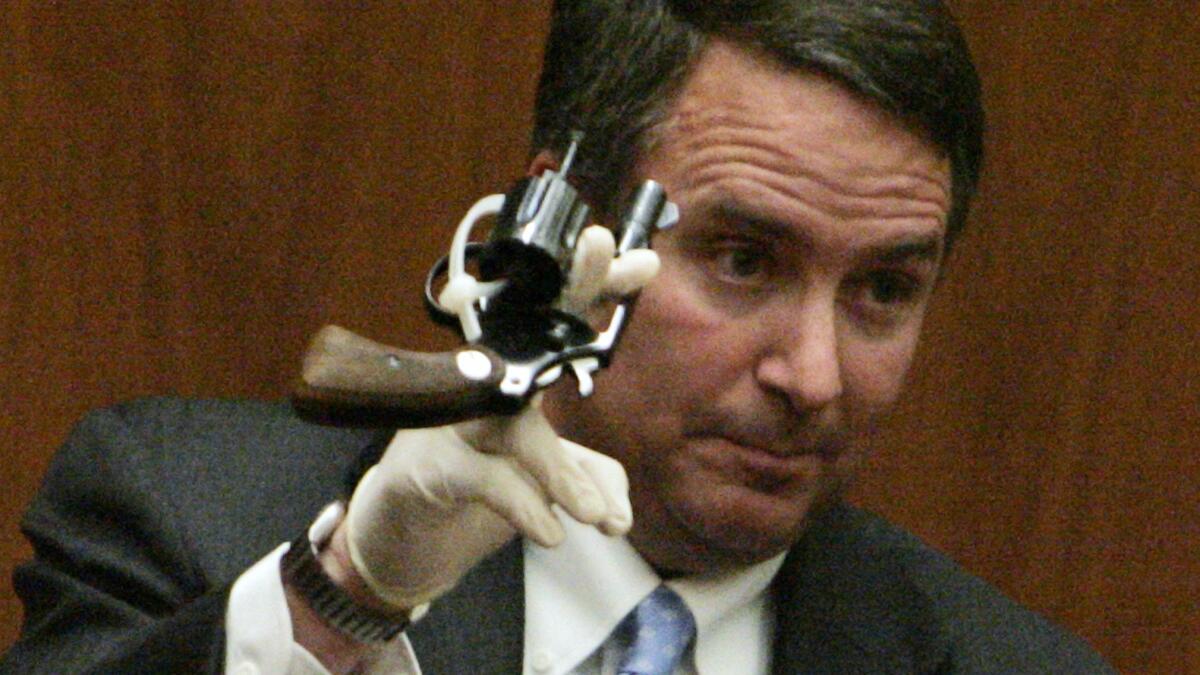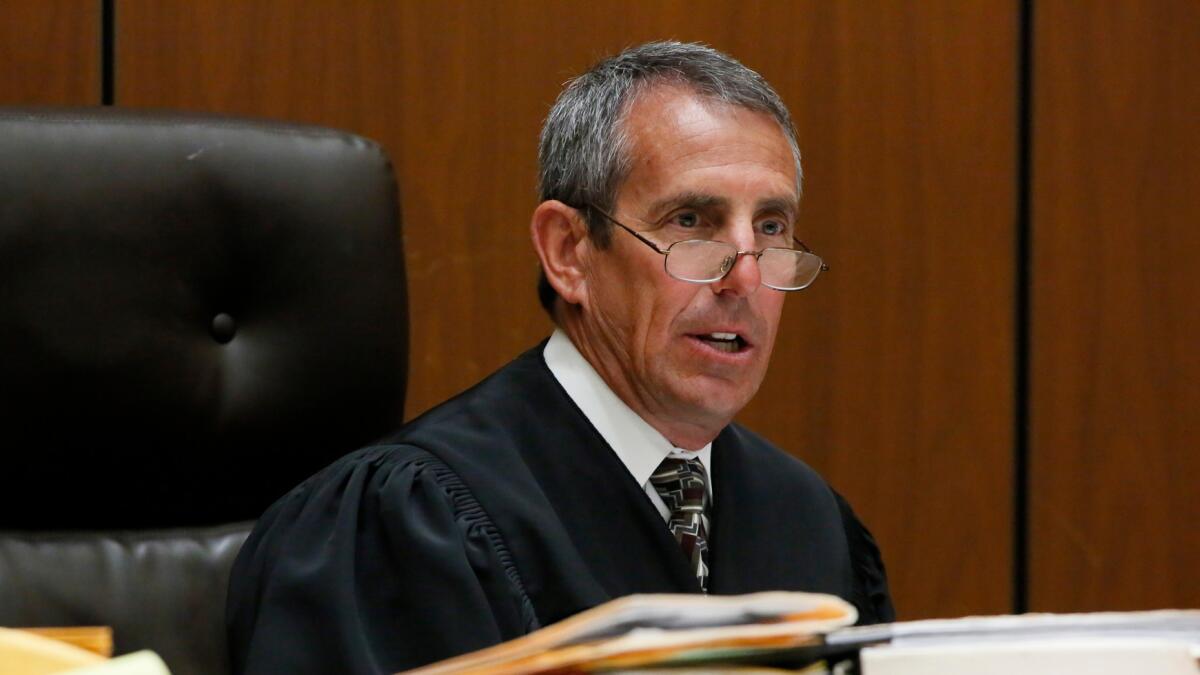How a dispute over dog droppings put a celebrated homicide detective and a judge under scrutiny

Throughout his more than three-decade career, Det. Mark Lillienfeld built a reputation as one of the finest homicide detectives in the Los Angeles County Sheriff’s Department.
The murder case of racing legend Mickey Thompson languished for years until Lillienfeld took over the investigation and saw it through to a conviction. In 2009, he helped send music producer Phil Spector to prison for the fatal shooting of actress Lana Clarkson. A recent episode of the dramatized documentary series “Murder Book” described Lillienfeld as a “closer” who “blows through cases like a tornado.”
In late 2013, however, Lillienfeld’s focus was on a subject far from his usual beat: a middle-aged San Fernando Valley housekeeper named Connie Romero.
Lillienfeld scoured Romero’s past for any criminal history, tracked down her personal details and ran her name through confidential databases, according to law enforcement records reviewed by The Times. One evening, he drove to her Porter Ranch home and poked through a Dumpster, the records say.
But Romero was no killer. Rather, prosecutors considered her the victim of a crime.
She had, in fact, suffered bruises and cuts to her face during a confrontation over dog poop months earlier in a Chatsworth neighborhood. The case was investigated by the Los Angeles Police Department, not Lillienfeld’s agency. A battery charge had been filed against one of Lillienfeld’s longtime acquaintances, another veteran of the county’s justice system: Superior Court Judge Craig Richman.
The detective and the judge had known each other since at least 1996, when Richman was a prosecutor handling an attempted murder case Lillienfeld investigated. The detective would later visit the judge’s home to get warrants signed. Lillienfeld’s wife worked in Richman’s courtroom, transcribing hearings as an official court reporter.
The simple dispute over dog droppings led to investigations into two respected men of the law — a criminal trial for Richman, who was acquitted, and an internal Sheriff’s Department inquiry into why Lillienfeld dug into Romero’s background and whether he provided help behind the scenes to a friend in legal trouble.
::
On July 18, 2013, Romero was walking down a Chatsworth cul-de-sac with a client’s three dogs. The former tennis instructor cleaned a house in the neighborhood, having taken to picking up odd jobs because of epileptic seizures that limited her career options.
It was the day before her 51st birthday and she looked forward to celebrating with her sister.
A Honda Civic pulled up while she was along her usual route. The driver was Richman, an experienced judge and former prosecutor who handled crimes against police. He was on the phone with a caterer when he saw Romero drop a bag of dog poop on the street near his house. He told her to pick it up, according to court testimony. She refused.
She would later testify that the dogs were skittish and didn’t like the sound of the wind hitting the plastic bags so she planned to remove the excrement later.

The argument escalated. Richman claimed he was a police officer — a move he said was an attempt to calm her down. Romero tossed the bag of poop into the judge’s car.
After Richman pulled into his driveway and got out of his vehicle, the two clashed. Romero ended up on the pavement with blood on her face. Richman handed her a towel and ordered her off his property.
On Oct. 16, 2013, the Los Angeles city attorney’s office charged the judge with battery. Prosecutors said Romero had a scraped knee, an injured wrist and a cut above her eye.
As the case headed to trial, the defense attacked Romero’s credibility, producing a report showing she had been arrested weeks after the confrontation with Richman. A Ventura County sheriff’s deputy had taken her into custody on suspicion of driving under the influence in Thousand Oaks. The deputy wrote that Romero was acting erratically and that he believed she was on drugs. Romero told him she was taking Depakote, the report said, a drug used to treat epileptic seizures and bipolar disorder. She was released that night, and no charges were filed.
Defense attorney James Blatt argued that the report suggested Romero was unstable and unreliable and that it bolstered Richman’s claim that she had been the aggressor.
Deputy City Atty. Joshua Geller, the prosecutor on the case, was startled to see the arrest report in Blatt’s court filing. Arrest reports are highly protected documents generally obtained through a subpoena.
Geller later told authorities that Blatt said he obtained the report through his private investigator, David Hance.
In an interview with The Times, Hance said the report had shown up out of the blue at Blatt’s office.
“I have no idea what the origin is,” Hance said. “This report did not come from me.”
Blatt declined to comment on how the report came into his possession.
Geller informed the court during a pretrial hearing that he believed the arrest report was illegally obtained, according to a transcript of the hearing. But he dropped the issue when Superior Court Judge Christine C. Ewell said she thought Romero’s DUI arrest was irrelevant to the case and shouldn’t be introduced as evidence. Jurors never heard about the document, nor how it was procured.
During the trial, Richman admitted pushing Romero but said he did so “to create a safety zone” for himself after she pushed him first. When he was acquitted, his lawyer likened the case to the Salem witch trials, decrying it as an abuse by the city attorney’s office.
Romero’s arrest report did not affect the outcome of the trial, but a mystery remained: How had it landed in the hands of the defense team?
That became a question for sheriff’s internal investigators, whose inquiry quickly pointed to the only person who had requested the document: Lillienfeld.
::
The actions Lillienfeld took while researching Romero were detailed in a lengthy sheriff’s report and summarized in a district attorney’s memo reviewed by The Times.
Lt. Reinhardt Schuerger, who led the investigation into the detective, learned that days after the criminal charge against Richman made news, Lillienfeld searched a department database for Romero’s name. He used the penal code for perjury as the reason for his inquiry.
Lillienfeld also reached out to a Los Angeles city fire investigator, asking him to check his agency’s database for Romero. “If a subpoena or order is needed, it is not a problem,” Lillienfeld wrote in an email.
The fire investigator replied that the detective required a search warrant. It did not appear that Lillienfeld ever followed up.
On Nov. 15, 2013, Lillienfeld received an email from Richman’s personal account.
“Thanks for your help and your friendship,” the judge typed. He included a link to a video of his son waterskiing.
Two weeks later, Lillienfeld faxed a request to the Ventura County Sheriff’s Department for Romero’s arrest report. He said he was conducting a “threat to public official” inquiry. He received the arrest report soon afterward.
As Richman’s trial drew near, Lillienfeld received a voicemail message and an email from Geller, the prosecutor, asking about the threat inquiry and how Romero’s arrest report could have made its way to the defense, according to the records.
Lillienfeld never replied but forwarded Geller’s email to his partner with a note suggesting that he might complain to the city attorney or the state bar association.
“fyi. is it me or is this both snotty and threatening,” the detective wrote.
When Schuerger called the Ventura County Sheriff’s Department, he discovered that the agency logs all requests for arrest reports and stamps them with the name of the person asking for the documents and the words “not to be duplicated.” The stamp on the arrest report filed by Richman’s attorney appeared to have been whited out, Schuerger wrote in his assessment.
It is a misdemeanor for a law enforcement officer to obtain information from confidential criminal records and reports for personal reasons or furnish it to someone not involved in the investigation.
Schuerger and a sheriff’s sergeant confronted the detective in July 2014.
Lillienfeld acknowledged that he had been investigating Romero, but insisted it was a command from then-Sheriff Lee Baca, who had been worried about Richman’s safety and ordered a threat assessment — a job normally handled by a different unit within the agency.
Lillienfeld presented a case file containing some of his research on Romero, including handwritten notes in which he wrote that Baca had mentioned the 1999 murder of a court commissioner and didn’t want history to repeat itself.
When informed at a second interview that Baca and three of his former aides had no recollection of the assignment, Lillienfeld gave a caustic reply, according to the law enforcement records.
“It’s possible a 70-plus-year-old man might be suffering perhaps from some form of a memory loss or the beginnings of dementia or some other mental disability that is impairing his memory in some manner. That’s what is possible. Can’t make that any clearer to you, can I, Lieutenant?”
See the most-read stories in Local News this hour »
Through his attorney, Baca, 74, declined to comment to The Times. The retired sheriff, who faces federal charges of obstruction, conspiracy and lying, recently said he is in the early stages of Alzheimer’s disease.
Lillienfeld told the investigators that he considered Richman mostly a professional friend, but that he had socialized with the judge two or three times shortly before the battery charge.
When questioned about Richman’s email of thanks, the detective said the judge was referring to Lillienfeld’s encouragement to “keep a chin up and that this too will pass.”
Lillienfeld said he had obtained Romero’s arrest report, but denied providing it to Richman or his defense. The judge and his attorney declined Schuerger’s interview requests.
Contacted by The Times, Lillienfeld said he would be “more than happy” to give a “complete story” if The Times obtained approval from his supervisor. After the supervisor said permission was unnecessary, the 59-year-old detective declined to comment.
A sheriff’s spokesman would not disclose whether Lillienfeld was ever disciplined because it was a personnel matter.
Richman declined to describe his relationship with the detective, other than to say the two had not spoken in months. Asked about his battery case and whether Lillienfeld provided help, Richman, 58, asked a Times reporter to leave his chambers.
“Look, I’m a Superior Court judge and I can’t comment on things you’re asking,” he said.
::
The district attorney’s office determined there was not enough evidence to charge Lillienfeld, because there was no way to prove beyond a reasonable doubt that Baca hadn’t ordered him to investigate Romero. And because Richman, his attorney and private investigator would not speak to sheriff’s investigators, there was insufficient evidence to prove that Lillienfeld provided a copy to the judge’s defense team, a prosecutor wrote in a memo.
Romero was shocked to learn that Lillienfeld had looked into her background.
“Everybody told me, ‘You’re not gonna win, that’s a judge, they’re protected,’” Romero recalled.
“You start to distrust the system from the bottom up,” said her sister, Linda Gregoire.
Schuerger — who retired from the Sheriff’s Department last year — said although the evidence against Lillienfeld was circumstantial, the paper trail was straightforward.
“Lillienfeld received the report and somehow the judge’s attorney had the copy of the exact same report,” Schuerger said. “It was a little neighborhood thing that ended up becoming a mess.”
Twitter: @corinaknoll
MORE LOCAL NEWS
No joke: A priest, a rabbi and a social scientist consider the election’s emotional fallout
Appeals court upholds a judge’s decision to toss prosecutors off a mass-shooting case
More to Read
Sign up for Essential California
The most important California stories and recommendations in your inbox every morning.
You may occasionally receive promotional content from the Los Angeles Times.











